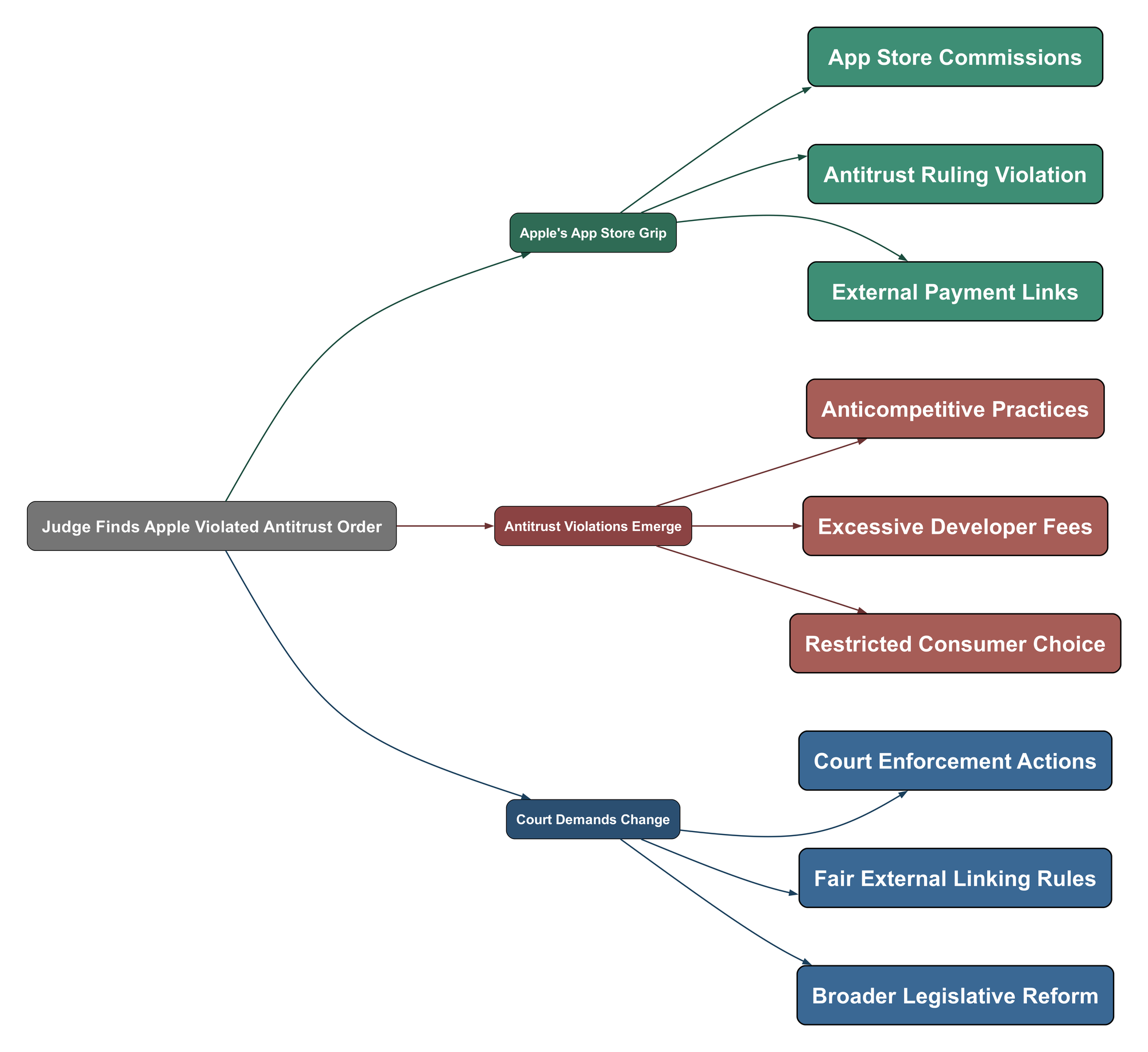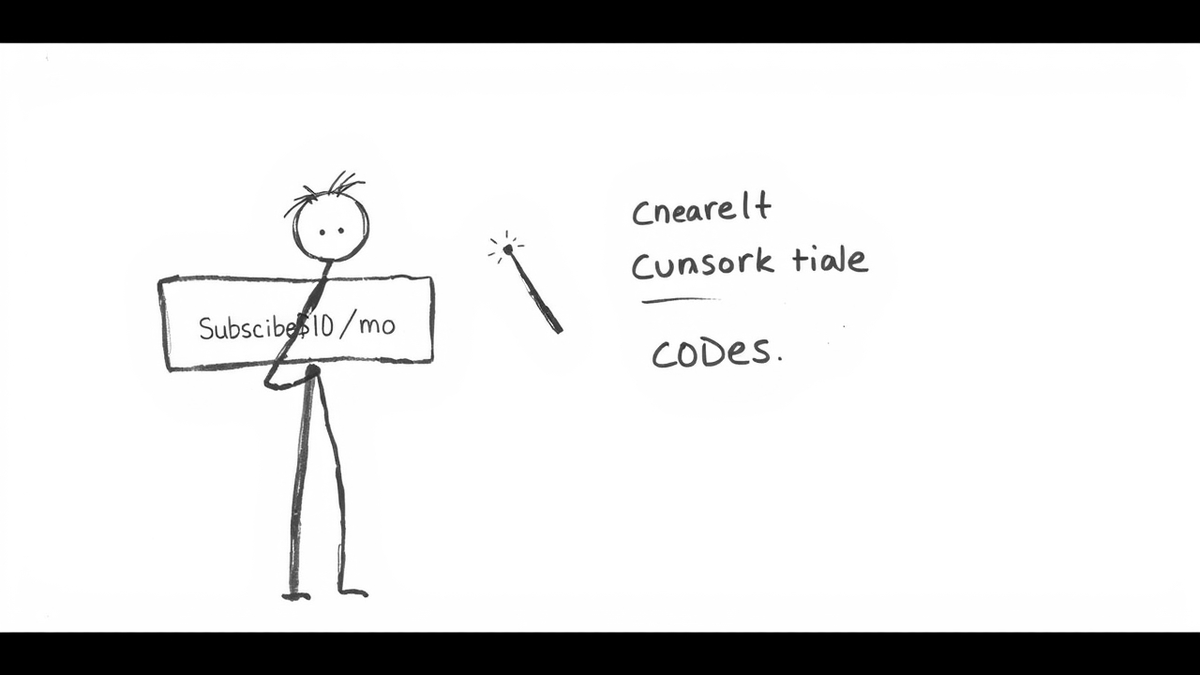Apple’s carefully curated App Store experience faces a major challenge. A recent court ruling found the tech giant violated an antitrust order, potentially shaking up how developers and users interact with the ecosystem. What does this mean for you?
Apple’s App Store Grip
Apple maintains tight control over its iOS ecosystem, primarily through the App Store, which has become the default way users discover and install software. This control comes with significant financial implications.
- Apple historically charges a 15-30% commission on digital goods sold through the App Store, generating estimated revenues around $30 billion annually from commissions alone.
“The heart of Apple’s hypocrisy is this: they claim their 30% is necessary to support the developer ecosystem and fund its operations. But of course if that were true, they could easily charge a high enough platform membership fee directly to developers.”
- Following an initial antitrust ruling (Epic v. Apple), Apple was ordered to allow developers to link to external payment options.
- Apple’s implemented solution involved stringent rules, specific link formats, and a commission rate of 27% for external purchases, alongside imposing ‘scare screens’.
“In Slack communications dated November 16, 2021, the Apple employees crafting the warning screen for Project Michigan discussed how best to frame its language. Mr. Onak suggested the warning screen should include the language: ‘By continuing on the web, you will leave the app and be taken to an external website’ because ‘“external website” sounds scary, so execs will love it.’”
- Many developers found these conditions prohibitive and effectively useless for offering lower prices outside the App Store.
“They charge 27% for purchases made using external payment processors. Including Stripe fees that’s net-zero… They severely limit how you can display the external purchase link too, and display an obnoxious warning screen when you tap it. I would be surprised if a single developer adopted it.”
Antitrust Violations Emerge
The court has now determined that Apple’s implementation did not comply with the spirit or letter of the injunction, actively working to maintain its lucrative commission structure through anticompetitive means.
- The judge found Apple willfully chose non-compliance, designing its external linking policies to maintain revenue streams previously deemed anticompetitive.
“In stark contrast to Apple’s initial in-court testimony, contemporaneous business documents reveal that Apple knew exactly what it was doing and at every turn chose the most anticompetitive option.”
- Internal communications revealed disagreement, with figures like Phillip Schiller advocating for compliance, overruled by finance-focused executives and CEO Tim Cook.
“Internally, Phillip Schiller had advocated that Apple comply with the Injunction, but Tim Cook ignored Schiller and instead allowed Chief Financial Officer Luca Maestri and his finance team to convince him otherwise. Cook chose poorly.”
- Developers face significant hurdles, including high fees even for external payments, complex rules, and the need for expensive Apple hardware and developer program memberships.
“Developers have to pay $100 a year to be able to publish an app… Developers need to buy expensive Apple hardware… And on top of it, Apple also wants 30% of all the gross app sales.”
- Consumers are often unaware they could get better deals elsewhere, partly due to Apple’s marketing conflating App Store restrictions with OS security features.
“I think Apple has done a great job marketing the App Store as the reason for the security/UX of their platform, when in reality, it’s the OS… The confusion between benefits of the OS/benefits of the App Store… has made it more difficult to convince people of the merit of these antitrust suits.”
Court Demands Change
The court’s patience has run out, leading to a sharp rebuke and potential further action. This signals a need for genuine changes to Apple’s App Store policies.
- The judge explicitly stated Apple violated the injunction and referred the matter for potential criminal contempt proceedings due to misleading testimony.
“The Court refers the matter to the United States Attorney for the Northern District of California to investigate whether criminal contempt proceedings are appropriate.”
- A truly compliant solution would likely involve allowing external links with significantly lower friction and fees, enabling real price competition.
“I’m tired of apologizing to customers who purchase subscriptions in my app only to discover they could have purchased the exact the same thing from my website for 15% less.”
- Many argue for broader legislative changes allowing users to install software from outside the App Store (sideloading) or even install alternative operating systems, treating iPhones like other computers.
“we need legislative solutions that allow consumers to load software (or even other operating systems) on any computing device they own.”
- While potential fines could be substantial, some commentators doubt their effectiveness against Apple’s massive revenue unless they are exceptionally large.
“Unless the fine is the better part of a trillion dollars, it won’t make any difference. Apple has close to 1/2 trillion in revenue a year. A few billion is rounding error.”
The court’s finding marks a significant development in the ongoing battle over app store economics and control. It remains to be seen how Apple will respond and whether this will lead to meaningful changes for developers and consumers.





